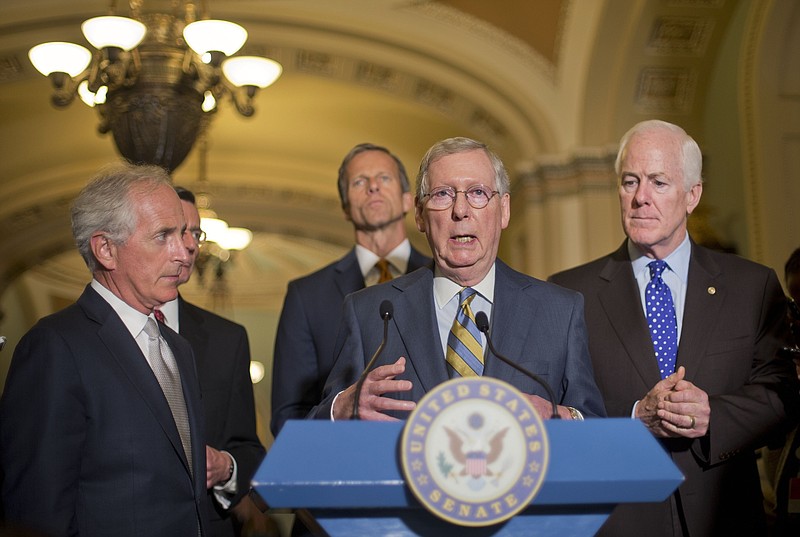What looked like Mount Everest - uphill in the snow barefoot both ways - became level ground finally this week when Senate Democrats blocked a Republican resolution to disapprove of the six-nation nuclear accord with Iran.
The vote means peace will get a chance.
Even Gary Samore, a former nuclear adviser to President Barack Obama who until earlier this month headed a group opposing the deal until he analyzed the final document, says even if Iran doesn't abide by the rules, the deal puts the United States in a stronger position.
"We will have bought a couple of years, and if Iran cheats or reneges we will be in an even better position to double down on sanctions or, if necessary, use military force," he said. "If I knew for certain that in five years they would cheat or renege, I'd still take the deal."
The procedural vote Thursday fell two short of the 60 needed to break a Democratic filibuster and ensured the Iran nuclear deal announced by the president and Secretary of State John Kerry last July will take effect without a veto showdown between Congress and the president.
But the process to get the deal approved by Congress - or at least not opposed - was ugly and contentious.
What our own Republican Sen. Bob Corker said he wanted and expected to be a bipartisan effort to review and vote on the deal became totally partisan.
Not one Senate Republican voted in favor of the accord. All but four Senate Democrats said yes to it.
So much for bipartisanship.
The New York Times wrote of the vote: "While bipartisan victories tend to be those most celebrated outside of Washington, success by the president is now often measured more by the scope of the policy achieved than by any claim of sweeping consensus. And losing has its own evolving meaning as well. Republicans will use Mr. Obama's triumph - as they did with the health care law - as a means to attack Democrats in anticipation of next year's election."
In fact, it has begun already.
Sen. Lindsey Graham of South Carolina said Thursday on the Senate floor : "To my Democratic friends, you own this. You own every 'i' and every 't' and every bullet. You own everything that is to follow, and it's going to be holy hell."
Sen. Marco Rubio of Florida said it was incumbent on Mr. Obama's successor to repeal the accord.
"Iran may have a supreme leader, but America does not," Mr. Rubio said. "In this nation, we have a republic, and soon, we'll have new leaders not only in this chamber, but also in the executive branch. I pray in their first day in office they will revise this deal, or history will condemn us."
Of course, there also is a shoe on the other foot, noted Sen. Richard J. Durbin, D-Ill.
"If this moves forward and the Iranians live with the agreement and don't breach it, some important things are going to happen in terms of inspectors on site, centrifuges destroyed, some amazing things that make the Middle East and Israel safer," Durbin said. "And for someone to announce as one of our would-be president candidates did on the floor here 'I am going to blow this agreement away if I ever have the chance' is really to ignore the possibility that it could work. And I want it to work."
We all should want it to work. And there is zero reason not to try it.
Unless you are Republican and subscribe to GOP avoidance. think back to 2011 and the House Republicans' refusal to raise the federal debt limit on terms the president could accept. Sen. Mitch McConnell, R-Ky., pushed Congress to let Obama raise the debt limit unless lawmakers blocked it, which required a veto override that proved unattainable. Obama got the increase his administration needed to avert economic calamity, and Republican lawmakers largely avoided blame for sequester-panicking the country while still getting to vote against raising the debt limit.
But the "blame game" is no way to govern. It is why Americans see Congress and Washington in such a poor light.
Don't expect any GOP enlightenment, however.
The House of Representatives on Friday rejected the Iran deal overwhelmingly and sharply along partisan lines, despite the fact that the Senate vote settled the matter. Some House Republicans said they may follow the new rules of politics set when they crusaded against the Affordable Care Act. They may file a lawsuit that would claim the White House failed to disclose the full details of the nuclear accord as required by a law adopted last spring. The Senate scheduled a repeat vote for Tuesday, though the result is expected to remain the same.
It's all posturing.
What a shame it is that our leaders are more keen on making partisan campaign-attack ads than on seeking peace with diplomacy.
